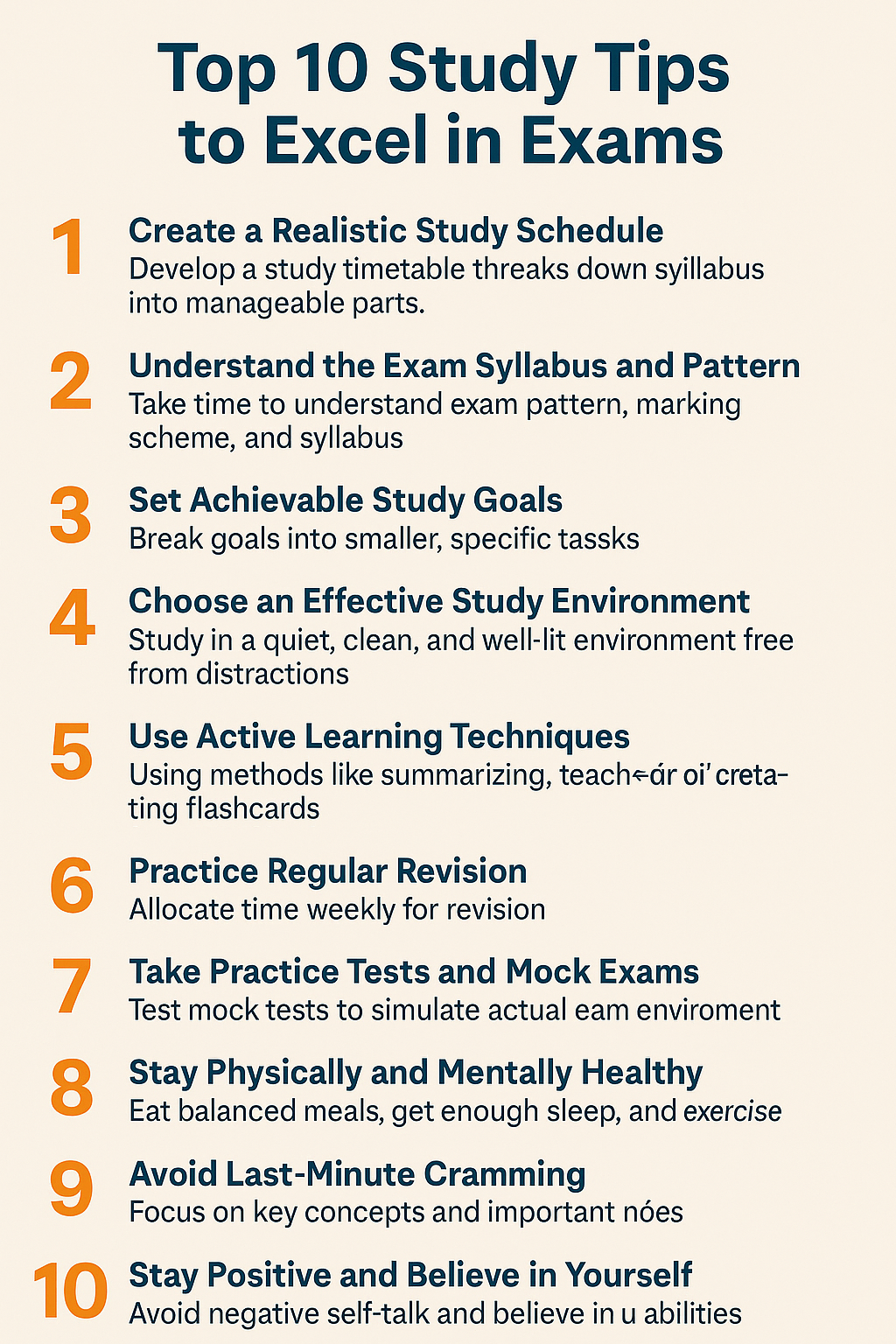Top 10 Study Tips to Excel in Exams – Best Strategies for Academic Success

Preparing for exams can be stressful, especially when time is limited and the syllabus seems endless. However, with the right strategies and a disciplined approach, anyone can improve their performance and reduce exam anxiety. In this article, we’ll explore the top 10 best study tips for exams that can help students of all levels study smarter, stay focused, and achieve better results.
1. Create a Realistic Study Schedule

One of the most effective ways to prepare for exams is by organizing your study time. Develop a study timetable that breaks down your syllabus into manageable parts. Allocate more time to subjects or topics you find difficult and ensure you stick to the plan consistently. A good timetable also includes regular breaks and time for revision.
2. Understand the Exam Syllabus and Pattern

Before diving into your books, take time to understand the exam pattern, marking scheme, and syllabus. This helps you prioritize important topics and avoid wasting time on less relevant material. Reviewing previous years’ question papers can give you insights into frequently asked questions.
3. Set Achievable Study Goals
Setting clear and achievable goals helps keep you motivated and focused. Instead of vague plans like “study science today”, break your goals into smaller, specific tasks such as “complete Chapter 3: Human Digestive System”. This approach creates a sense of accomplishment as you check off each task.
4. Choose an Effective Study Environment
Your surroundings greatly influence your focus and productivity. Study in a quiet, clean, and well-lit environment free from distractions. Whether it’s a library, a study room, or a quiet corner of your home, make sure it supports concentration and efficiency.
5. Use Active Learning Techniques
Passive reading is not enough for effective learning. Use active study methods like summarizing chapters in your own words, teaching others, creating flashcards, or drawing mind maps. These techniques enhance retention and help you understand the concepts deeply.
6. Practice Regular Revision
Regular revision is essential to retain what you’ve studied. Don’t wait until the last minute to revise. Allocate time weekly to go over previously covered topics. Creating short notes or summary sheets makes revision faster and more effective.
7. Take Practice Tests and Mock Exams
Mock tests simulate the actual exam environment and help you assess your preparation. Time yourself while solving sample papers or online quizzes. This improves time management, builds confidence, and helps identify weak areas needing more focus.
8. Stay Physically and Mentally Healthy
A healthy body supports a healthy mind. Eat balanced meals, stay hydrated, and get at least 7–8 hours of sleep daily. Regular physical activity like yoga or a short walk can relieve stress and refresh your mind.
9. Avoid Last-Minute Cramming
Cramming just before the exam is not only stressful but also ineffective. Instead, stick to your study plan and do light revision a day before the exam. Avoid learning new topics at the last minute. Focus on key concepts and important notes you’ve already studied.
10. Stay Positive and Believe in Yourself
A positive mindset can significantly impact your performance. Avoid negative self-talk and believe in your abilities. Surround yourself with supportive people, and don’t hesitate to take help from teachers or mentors when needed. Confidence and a calm mind are powerful tools in the exam hall.
Final Thoughts
Success in exams doesn’t come overnight. It requires a combination of smart planning, disciplined execution, and a positive attitude. These 10 best study tips for exams are designed to help you build a strong foundation for exam success without stress. By following these strategies, you’ll not only perform better in exams but also develop lifelong study habits that contribute to academic excellence.
Whether you’re preparing for school exams, board exams, or competitive entrance tests, these tips will guide you towards your goals effectively. Stay motivated, stay organized, and remember – consistent effort is the key to success.





